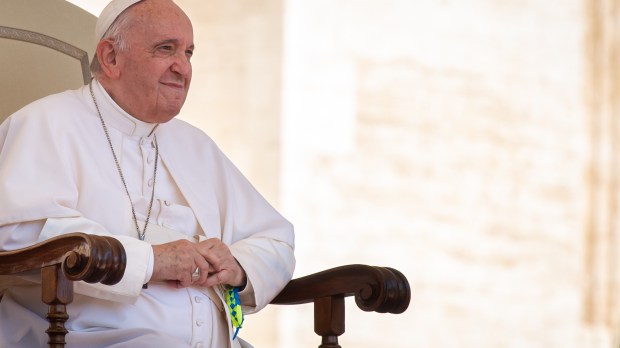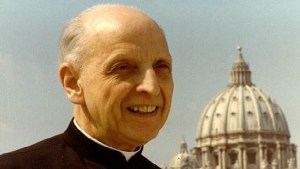Pope Francis had a meeting with the editors of a handful of Jesuit journals published in Europe. He said that he didn’t have a speech prepared and invited the editors to ask him questions, which they did – on topics ranging from reaching youth, to Ukraine and World War III.
Here, we offer a brief summary of the questions. La Civiltà Cattolica of Italy has provided the original text and full English translation here.
Pope Francis often insists on the need to keep ourselves firmly planted in reality. Prayer, for example, is an exercise in this, he says. “To base one’s life on the Word of God, therefore, is not an escape from history, but an immersion into earthly realities…”
His advice to the journal editors once again reflected this insight.
For example, I recently met with the “Santa Marta Group,” which works on the scandalous reality of human trafficking. This is something that moves us, touches us and pushes us forward. On the other hand, abstract ideas about the enslavement of people do not move anyone. We have to start from experience and its narration.
A peaceful future
Asked about how the journals can contribute to peace in coverage of Ukraine, the Holy Father offered a nuanced answer.
To answer this question we have to move away from the normal pattern of “Little Red Riding Hood”: Little Red Riding Hood was good and the wolf was the bad guy. Here there are no metaphysical good guys and bad guys, in an abstract sense.
He went on to reflect that “Something global is emerging, with elements that are very much intertwined,” and quoted a head of state — who he did not name — as having told him months ago that the movements of NATO could lead to war.
Someone may say to me at this point: So you are pro-Putin! No, I am not. It would be simplistic and wrong to say such a thing. I am simply against reducing complexity to the distinction between good guys and bad guys without reasoning about roots and interests, which are very complex.
World War III
The Pope went on to lament the other situations of global conflict that don’t garner the attention that Ukraine gets – northern Nigerian, Congo, Myanmar, and others.
The world is at war. A few years ago it occurred to me to say that we are living the third world war piece by piece. For me, today, World War III has been declared. This is something that should give us pause for thought. What is happening to humanity that we have had three world wars in a century?
The Pope then recalled the 75th anniversary of the Normandy landings, and his November visits to cemeteries, where, he said, seeing the ages of the young men entombed there brought him to tears.
Why am I telling you this? Because I would like your journals to deal with the human side of war. I would like you to show the human drama of war. It is all very well to make a geopolitical calculation, to study things in depth. You must do so because that is your duty. But also try to convey the human drama of war: the human drama of those cemeteries, the human drama of the beaches of Normandy or Anzio, the human drama of a woman whose receives a knock on the door, it’s a postman with a letter thanking her for having given a son to the country, who is a hero of the country. But she is then left alone. Reflecting on this would help humanity and the Church a great deal. Make your socio-political reflections, without however neglecting human reflection on war.
Francis spoke at some length about the heroism of the Ukrainian people — “It is as if history has predisposed Ukraine to be a heroic country. Seeing this heroism touches our hearts” — and said that he hopes to have a chance to speak with Russian Orthodox Patriarch Kirill at a general assembly in Kazakhstan in September. “I hope to be able to greet him and speak a little with him as a pastor,” he said.
Spiritual renewal
Asked about spiritual renewal in the Church, the Pope said, “In the European Church I see more renewal in the spontaneous things that are emerging: movements, groups, new bishops who remember that there is a Council behind them.”
There’s still a long way to go in accepting Vatican II, the Pope suggested.
Restorationism has come to gag the Council. The number of groups of “restorers” – for example, in the United States there are many – is significant. … The problem is precisely this: in some contexts the Council has not yet been accepted.
Still, the Pope said, this is somewhat normal: “It is also true that it takes a century for a Council to take root. We still have 40 years to make it take root, then!”
Jesuit leader, Pedro Arrupe
Pope Francis turned his attention to what he said he witnessed in 1974 — “you were not yet born” — with the “ordeal of [Jesuit] Father General Pedro Arrupe during the 32nd General Congregation.”
The Pope said that today, Fr. Arrupe is seen as a saint, but that in his time, he was attacked.
Francis shared how Arrupe was “like a child” in regard to his affection for the pope. “With that spontaneous love!” But some in the order were waiting to see him “hanging from the gallows in St. Peter’s Square.”
Arrupe was a man of great obedience to the pope, great obedience. Paul VI understood that. The best speech ever written by a pope to the Society of Jesus is the one Paul VI made on December 3, 1974. He wrote it by hand. We still have the originals. The prophetic Paul VI had the freedom to write it.
… Why am I telling you this story? To make you understand what the post-conciliar period was like. This is happening again, especially with the traditionalists. That is why it is important to save these figures who defended the Council and fidelity to the pope. We must return to Arrupe: He is a light from that moment that illuminates us all.
Sweden, Germany, and the youth
The Pope went on to speak of Sweden and evangelizing in countries without a religious tradition; of the controversial synodal path in Germany; and about helping young people.
- [O]nly those who live there, in that context, can understand and discover the right paths. I would like to point out, however, a man who is a model of guidance, Cardinal Anders Arborelius. He is not afraid of anything. He talks to everybody and is not against anybody. He always aims for the positive. I believe that a person like him can indicate the right path to follow.
- To the president of the German Episcopal Conference, Bishop Bätzing, I said: “In Germany there is a very good Evangelical Church. We don’t need two.”
- Young people find their reason for being along the way, never in a static way. Some may be hesitant because they see young people without faith; they say they are not in the grace of God. But let God take care of them! Your task is to set them on the way. I think that is the best thing we can do.
Read the full text and English translation here.



